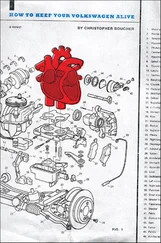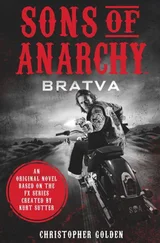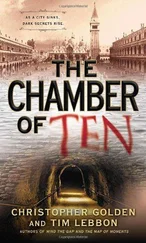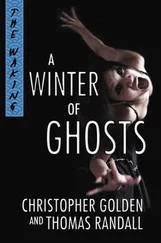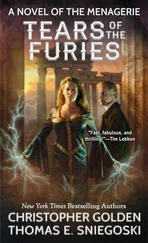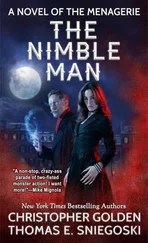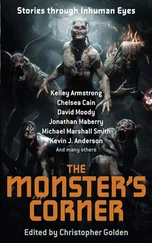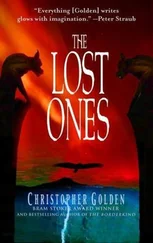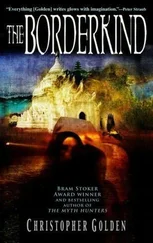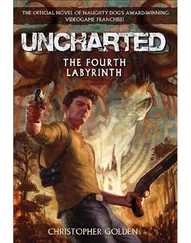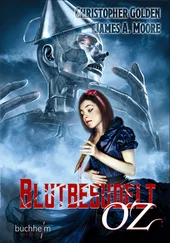“The Memory of Johnny Appleseed,” said the Memory of Johnny Appleseed.
“Great to meet you,” said Jim.
Just then, I saw my father’s truck pull into our driveway. He got out of the cab and watched a school of fathers pass him. I saw him look across the street. Then he began marching mechanically toward us. “What—” he said, his silver skin shining in the sun. “Who are these people?”
Jim extended his hand. “Name’s Jim,” he said.
“They’re fathers,” I said.
My Dad tried to compute this. “What are they doing here ?”
“Dads are really popular right now,” I said quietly.
“But you have a Dad,” said my father. “Me.”
“I know,” I said. “I thought — if we brought them to the flea bee—”
“OK, but you should have asked me about this first,” he said, rubbing the soot of toil off his forehead. “This is a really meaningful risk.”
“The seeds were only—”
“Fathers have huge appetites,” my Dad said. I could smell the work on his breath. “What do you plan to feed them?”
Across the street, fathers were looking for tasks. Two had opened the hood of my father’s truck and one was fixing the steel banister on the front step.
Jim looked at his watch. “Gosh darnit, I’m late,” he said.
“Late for what?” said my father.
“I’ve got a meeting at the office,” he said, straightening his tie.
“Will you be coming back?” I said.
Jim winced. “Probably not,” he said.
“Not ever?” I said.
“I’ve got a lot of work to catch up on,” Jim said. “  , you take care of yourself, all right, Son? You have a good life now, you hear?” Then he chucked me on the shoulder and charged toward the street.
, you take care of yourself, all right, Son? You have a good life now, you hear?” Then he chucked me on the shoulder and charged toward the street.
“Jim,” I said, weakly.
“Forget that one,” said my father. There was sudden meaning in his eyes. “Go back out to the fields. Keep them in their stalks until we figure out how to store them.”
I was dizzy. “How do I keep them there?”
My father ran his hands through his tired hair. “Do whatever it takes,” he said. “Try to reason with them. Tell them a story.”
My Dad ran toward the house and I went back into the groves. By then it was almost dusk, and more difficult to see — the running fathers made shadows on the white page.
When I reached the fatherfields, though, all was quiet. The only fathers left in those fields were not yet ripe, still sleeping in their stalks. I went from stalk to stalk, looking at their sleeping faces. Some fathers were mumbling to themselves; others were wheezing and snoring.
I won’t ever forget that chorus of snores. It sounded like family.
We left that piano out in the worryfields for anyone to play, but most people seemed to ignore it. Once I saw a Canada out there, sitting at the bench and staring at the keys, but I didn’t hear any music or changing points of view.
For a while, I didn’t think about the piano too much — it just sat there in the fields, switching points of view every now and again. That spring, though, I started spending a lot more time in those fields. By then, I think I was just craving company. I liked to watch the worriers pacing back and forth in the high grass, wringing their hands, hugging themselves or praying. I’d started praying again, too — not to my Mom, who I still hated for leaving, but directly to the Core. “How can you leave me here?” I prayed to it, my knees sinking into the page.
As usual, there was no response.
“Isn’t every single person holy? Even me?” I prayed.
A hole appeared in my palm.
“Not holey,” I prayed. “Holy! Like, sacred!”
Nothing.
Walking back from the worryfields one day, I passed by the piano and, on a whim, sat down on the stool. By that point the keys were warped and weather-stained. I pressed a note and heard the point of view of close worriers.
But mostly I was concerned about Bob. What would I tell him?
I pressed another note and the POV switched to a chorus pacing the edge of the field.
How are we supposed to live knowing that we may or may not have cancer somewhere in our body?
Another key called the point of view of the page.
Why is everyone looking at me so strangely? Do I have something on my face?
All that shifting point of view made me hungry. I stood up, walked home, and had a potato chip sandwich.
The next day, though, I went back to the piano. When I sat down at the keys this time, I tried two notes simultaneously. I heard whispers from the trees, the whining of a cloud, the gruff of a shingle.
Soon I was making chords, just like I’d seen the Possum do: three notes, and points of view, at once: my father’s point of view at the labor factory, fixing the Supply-Demander/the Memory of Johnny Appleseed, trading for seeds/a bird in the trees. I heard “… bad gasket?/trustworthy/shee-twee-bee!” simultaneously.
As I was leaning into the chord, though, my foot happened to push the foremost left pedal on the bottom of the piano. “Bee-twee-shee!” said the bird.
I stopped and looked down at the pedal. Then I pushed the right pedal. “Shee-twee-bee!” said the bird.
I played a different note and pushed the left pedal with my foot.
“Morning, Ralph,” said the Forebarrel.
“Morning,” I said. “What’s on tap for today?”
“Need you to take a look at the Demander in Building Six,” the Forebarrel said.
“Will do,” I said.
At first I didn’t understand what was happening; it took me a few minutes to recognize that the right pedal was moving the story forward in time and the left pedal reversing it. Every day that week, though, I went back to the piano and practiced. Soon, I was a good enough point-of-view piano player that I could shift the POV to a nearby tree in the margin, and then to the Memory of Johnny Appleseed in the deadgroves, and then to my house, at any time in their history. I saw my house as a young cabin, hiking a strange mountain with his fathershack. When I melodied further back, I saw Johnny Appleseed — the real Johnny Appleseed — stopping to tie the leather laces on his boots.
I practiced melody after melody — varying pedals, notes, and speeds — until I located, somewhere in the past pages, my mother praying to my father. I picked up the story midverse:
“I can’t, Ralphie,” she prayed.
“Why not?” he prayed.
“Because I have work to do still. We’re repairing holes day and night.”
“But why do you have to fix it?” prayed my father. “Why you ?”
“  is our son ! We should be the first ones on line to help Appleseed.”
is our son ! We should be the first ones on line to help Appleseed.”
There was silence.
“I miss you,” prayed my Dad. “We all do.”
“Any word from Bri?” my Mom prayed.
My Dad prayed that there wasn’t. “You?”
“We’re looking,” my Mom prayed. “We’ll find her.”
“You’ve checked all the auction schools?”
“Of course we have,” my Mom said. “And I’ve put out a national call to the Mothers’ Network.”
“I’m just praying that she’s OK,” my Dad said.
“Me, too — twice a day,” my Mom prayed. “What about  ?”
?”
“He’s fine. The same.”
“He won’t answer my prayers,” my Mom prayed.
“He says he’s angry at you,” my Dad prayed.
Читать дальше
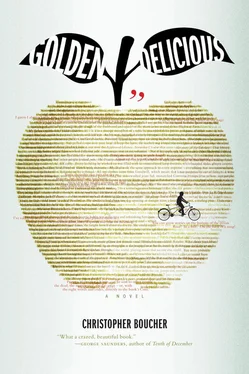
 , you take care of yourself, all right, Son? You have a good life now, you hear?” Then he chucked me on the shoulder and charged toward the street.
, you take care of yourself, all right, Son? You have a good life now, you hear?” Then he chucked me on the shoulder and charged toward the street.
